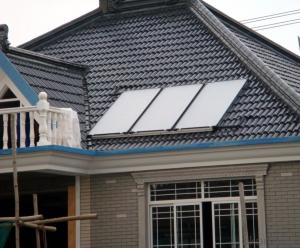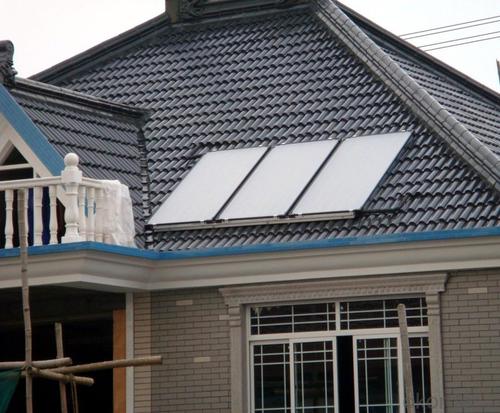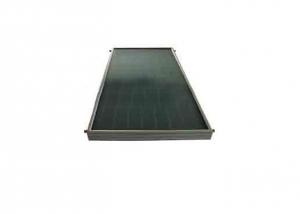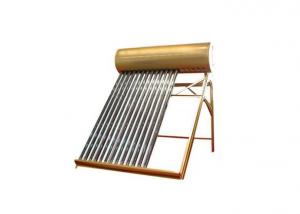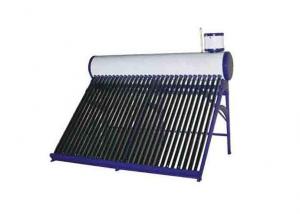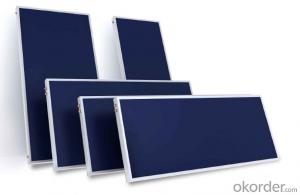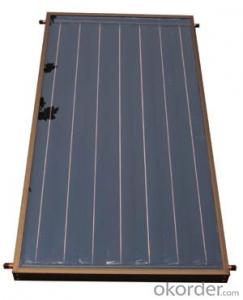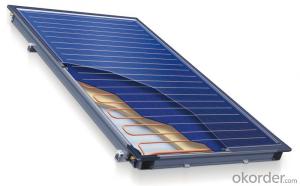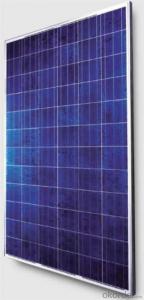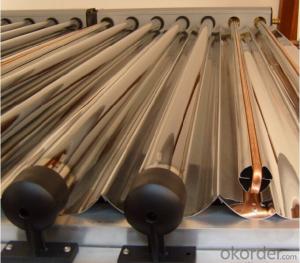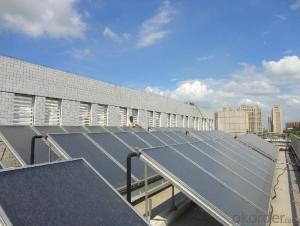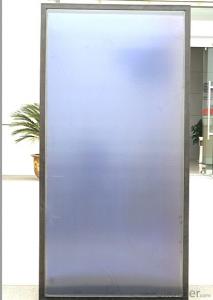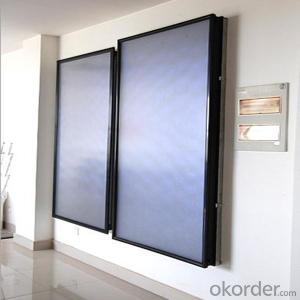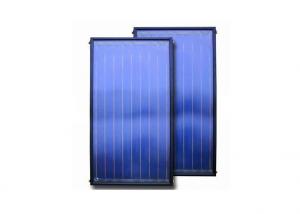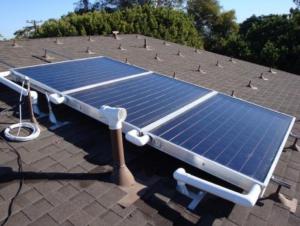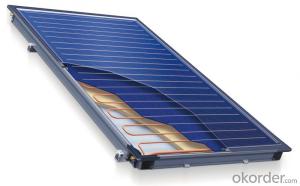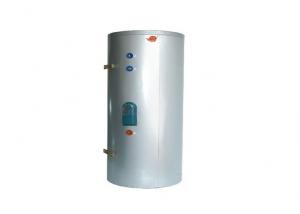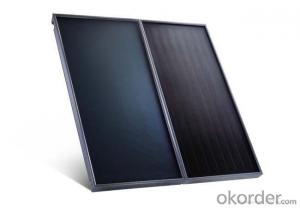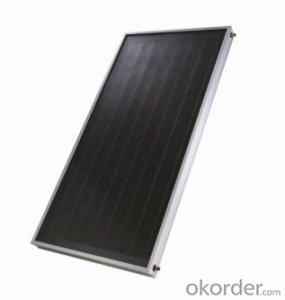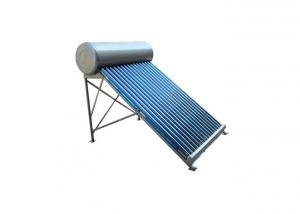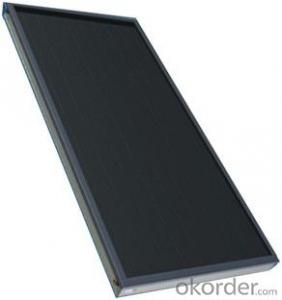Efficient Sunshore Balcony Type Flat Plate Solar Thermal Collectors
- Loading Port:
- Shanghai
- Payment Terms:
- TT OR LC
- Min Order Qty:
- 500 pc
- Supply Capability:
- 10000 pc/month
OKorder Service Pledge
OKorder Financial Service
You Might Also Like
flat plate solar thermal collectors :
1) Cover a window on heat pipe solar collector, has better appearance.
2) Reliable and efficient twin-glass solar tubes
3) Copper heat pipes for rapid heat transfer
4) Easy plug-in installation
5) Free maintenance
6) Work pressure: 8bars
7) Stable solar conversion during the day
8) The perfect solar collector for domestic solar water heater systems
9) Ideal for commercial solar water heating applications.
10) Has got certificate EN12975 & Solar Keymark.
How it works:
1) Connect with pressure water tank and workstation. Water is circulated through the header via intermittent pump cycling. Each time the water circulates through the header, the temperatures is raised by 5-10°C. Throughout the day, the water in the tank is gradually heated.
2) Solar absorption: solar radiation is absorbed by the solar tubes and converted into heat.
3) Solar heat transfer: heat pipes conduct the heat from within the solar tube up to the header pipe
Product information:
This kit has all the necessary elements to be interconnected ,guaranteeing a right operation and long
useful life with high performance. Green Product: use clean energy-solar & no poisonous metals, bring
health to life.Its installation is fast,easy,without any type of maintenance and has several options in harmony
with any type of roof.
1) The flat plate absorber collector is made of red copper or copper & aluminum complex ; the crust uses
anodized aluminum alloy frame material of high strength ,with airflow design
2) Tank Include:1.5/2.0/2.5 KW electric Heating element , T&P Valve ;Sensor,One way valve,drain valve
3) The insulating layer uses polyurethane bulk bubble and has a good effect of temperature preservation
4) The product successfully carries out the installation of separation according to fabricating yard and is
harmoniously blended with architecture
5) The equipments of separated solar water heater is composed by heat collector, storage tank, electric
control device, hot water mix unit and fittings for circulation and installation
- Q: Can solar collectors be used for heating water in homes?
- Yes, solar collectors can be used for heating water in homes. Solar water heating systems use solar collectors, also known as solar thermal panels or solar water heaters, to capture the sun's energy and convert it into heat. These collectors are usually installed on the roof or in an open area where they can receive maximum sunlight exposure. The collectors contain tubes through which a heat transfer fluid, such as water or antifreeze, circulates. As the sun's rays hit the collectors, the fluid inside absorbs the heat, which is then transferred to a storage tank or directly to the home's water supply. This heated water can be used for various domestic purposes, including bathing, washing dishes, and doing laundry. Solar water heating systems are an environmentally friendly and cost-effective alternative to traditional water heating methods, as they reduce the reliance on fossil fuels and can significantly lower energy bills.
- Q: Can solar collectors be used for heating restaurants and cafes?
- Yes, solar collectors can definitely be used for heating restaurants and cafes. Solar thermal collectors, also known as solar water heaters, are specifically designed to convert sunlight into heat energy. By capturing the sun's rays and transferring the heat to a liquid, such as water or a heat transfer fluid, solar collectors can provide hot water or space heating for various applications, including restaurants and cafes. In a restaurant or cafe setting, solar collectors can be used to heat water for dishwashing, handwashing, and general cleaning purposes. They can also be integrated into the building's heating system to provide space heating during colder months. Solar collectors can be installed on rooftops, facades, or in dedicated areas with ample sunlight exposure to maximize their efficiency. Utilizing solar collectors for heating establishments like restaurants and cafes offers several benefits. Firstly, it helps reduce reliance on fossil fuels and conventional heating methods, thereby lowering greenhouse gas emissions and contributing to a cleaner environment. Additionally, solar energy is a renewable resource, meaning it is abundant and free, leading to potential cost savings on energy bills in the long run. However, it's important to note that the effectiveness of solar collectors for heating restaurants and cafes may vary depending on several factors, such as the size of the establishment, energy demand, geographical location, and available sunlight. Therefore, it is crucial to conduct a proper assessment of the specific requirements and feasibility before implementing a solar heating system. Consulting with solar energy experts or professional installers can help determine the most suitable configuration and ensure optimal performance.
- Q: Can solar collectors be used in recycling facilities?
- Yes, solar collectors can be used in recycling facilities. Solar energy can be harnessed to provide power for various operations within a recycling facility, such as powering equipment, lighting, or heating water. This renewable energy source can help reduce reliance on traditional forms of energy, making recycling processes more sustainable and environmentally friendly.
- Q: How much space is needed to install a solar collector?
- The amount of space needed to install a solar collector varies depending on the size and type of the collector. Generally, a small residential solar collector can be installed on a rooftop and may require around 10-15 square feet of space. Larger commercial or industrial solar collectors may require significantly more space, such as several hundred square feet or even acres, depending on the energy demand and design of the system. It is recommended to consult with a solar installation professional to determine the specific space requirements for your desired solar collector.
- Q: Can solar collectors be used for heating warehouses?
- Yes, solar collectors can be used for heating warehouses. Solar thermal collectors can efficiently capture and convert solar energy into heat, which can then be used for space heating in warehouses. This can provide a cost-effective and sustainable solution for heating large commercial spaces like warehouses.
- Q: What is the lifespan of a solar collector system?
- The lifespan of a solar collector system can vary depending on its quality, maintenance, and usage. Generally, well-maintained solar collector systems can last between 20 to 30 years or more.
- Q: Can solar collectors be used for sterilization?
- Yes, solar collectors can be used for sterilization. Solar collectors can generate heat, which can be harnessed and used for a variety of purposes, including sterilization. By using solar energy to heat water or other substances, it is possible to achieve the high temperatures required for sterilization processes. This can be particularly useful in remote areas or regions with limited access to electricity, where solar collectors offer a sustainable and cost-effective solution for sterilization needs.
- Q: How do solar collectors affect the resale value of a property?
- Solar collectors can significantly increase the resale value of a property. As they reduce energy costs and provide sustainable energy, they appeal to environmentally conscious buyers. Additionally, solar collectors may qualify homeowners for tax incentives and grants, making the property more attractive to potential buyers.
- Q: Are solar collectors eligible for government incentives?
- Yes, solar collectors are eligible for government incentives. Many governments worldwide offer various incentives and subsidies to encourage the adoption of renewable energy sources, including solar collectors. These incentives can include tax credits, grants, and feed-in tariffs, among others, to help offset the initial installation costs and make solar collectors more affordable for individuals, businesses, and organizations.
- Q: Where are solar collectors commonly used?
- Solar collectors are utilized in various locations and applications worldwide. Residential homes often employ solar collectors on rooftops to generate clean and sustainable energy. Commercial buildings, such as offices and factories, also commonly utilize solar collectors to offset energy consumption and diminish carbon emissions. Solar collectors can be found in large-scale solar power plants, where they produce electricity on a utility scale. These power plants typically possess extensive arrays of solar collectors that track the sun's movement and convert sunlight into electricity. Moreover, solar collectors are employed in remote and off-grid locations where access to conventional energy sources may be limited. Rural areas, campsites, and even space stations benefit from solar collectors as they provide a reliable energy source for lighting, heating, and powering electronic devices. Additionally, solar collectors play a crucial role in the agricultural sector. They are used for water heating in greenhouses to create the ideal conditions for plant growth. Solar collectors are also used for irrigation purposes, utilizing collected solar energy to power pumps that distribute water to crops. In summary, solar collectors have diverse applications in residential, commercial, industrial, remote, and agricultural settings. They harness the sun's power, making them an invaluable and sustainable energy solution.
Send your message to us
Efficient Sunshore Balcony Type Flat Plate Solar Thermal Collectors
- Loading Port:
- Shanghai
- Payment Terms:
- TT OR LC
- Min Order Qty:
- 500 pc
- Supply Capability:
- 10000 pc/month
OKorder Service Pledge
OKorder Financial Service
Similar products
Hot products
Hot Searches
Related keywords
